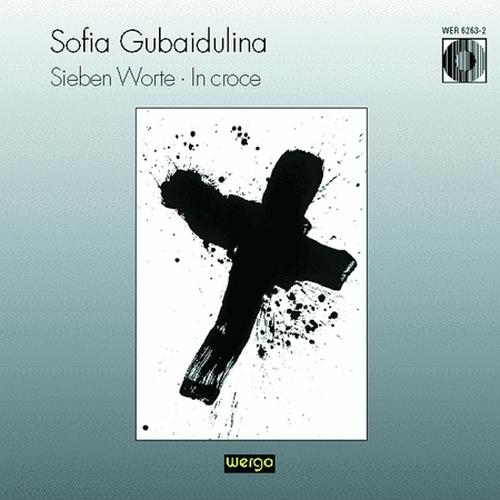
Wydawnictwo: Wergo
Nr katalogowy: WER 62632
Nośnik: 1 CD
Data wydania: styczeń 1994
EAN: 4010228626322
Nr katalogowy: WER 62632
Nośnik: 1 CD
Data wydania: styczeń 1994
EAN: 4010228626322
Nasze kategorie wyszukiwania
Epoka muzyczna: współczesna
Obszar (język): rosyjski
Instrumenty: wiolonczela, akordeon
Epoka muzyczna: współczesna
Obszar (język): rosyjski
Instrumenty: wiolonczela, akordeon
Gubaidulina: Sieben Worte, In croce
Wergo - WER 62632
Wykonawcy
Julius Berger, cello
Stefan Hussong, accordion
Kammerorchester Diagonal / Florian Rosensteiner
Julius Berger, cello
Stefan Hussong, accordion
Kammerorchester Diagonal / Florian Rosensteiner
Sofia Gubaidulina - born in Tschistopol (in the Tartar republic) and trained in Kasan and Moscow - did not have an easy life in the Soviet Union. When a critic in 1962 praised her impeccable technique but belittled her intellectual position, she nevertheless held fast to her artistic credo. In the middle of the 1960s her works began to be played in the West; commissions and prizes soon followed, and from the 1980s she was able to travel regularly. Today she lives in a small town near Hamburg, Germany. In Gubaidulina's composition "Sieben Worte" [Seven Words], which refers with its seven movements to the cantata by Heinrich Schütz, the fourth movement "My God, my God, why hast Thou forsaken me?" is the central part of the whole composition. The following movements gradually lead to Christ's transformation (musically indicated by the cellist, who gradually moves the bow closer to the bridge until, in the seventh movement, he plays below the bridge, "dietro ponticello"). Now there sounds in the tutti strings, here spread over seven octaves, the symbol of the cross. Gubaidulina's composition "In croce" is a large sonorous symbol of the cross: One instrument begins in the highest register, the other one in the lowest register; they gradually move towards each other mixing at a certain point and separate themselves from one another with an exchange of roles. Sofia Gubaidulina has said that she understands religion as "religio", as the reestablishment of a connection or an unity which is increasingly lost in the "staccato of life". In this sense composing is for her a religious act, every work a new path to "religio".












